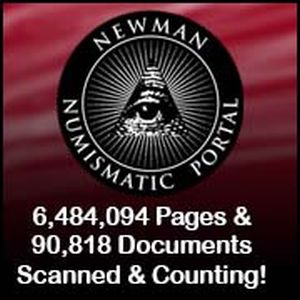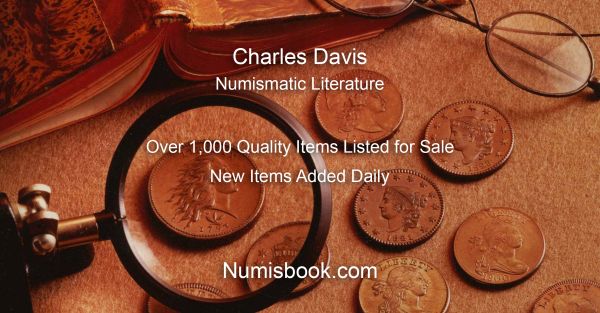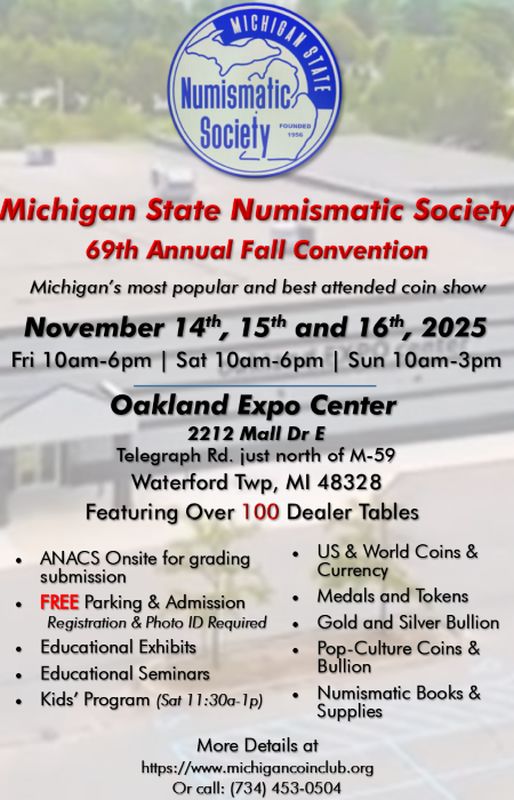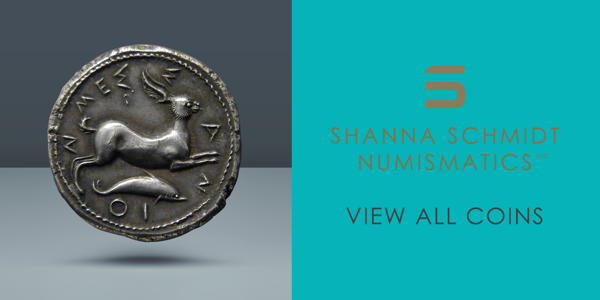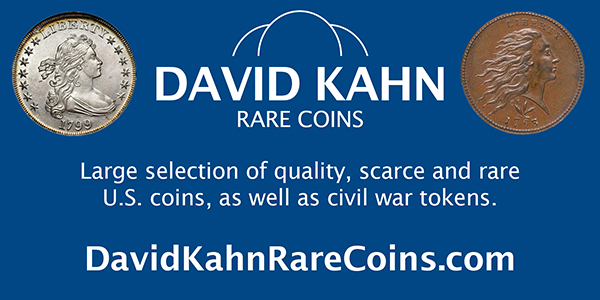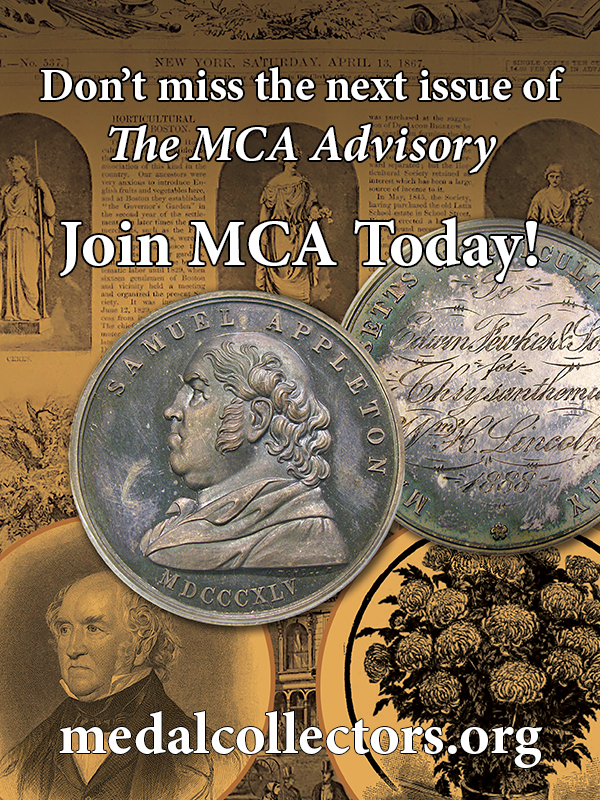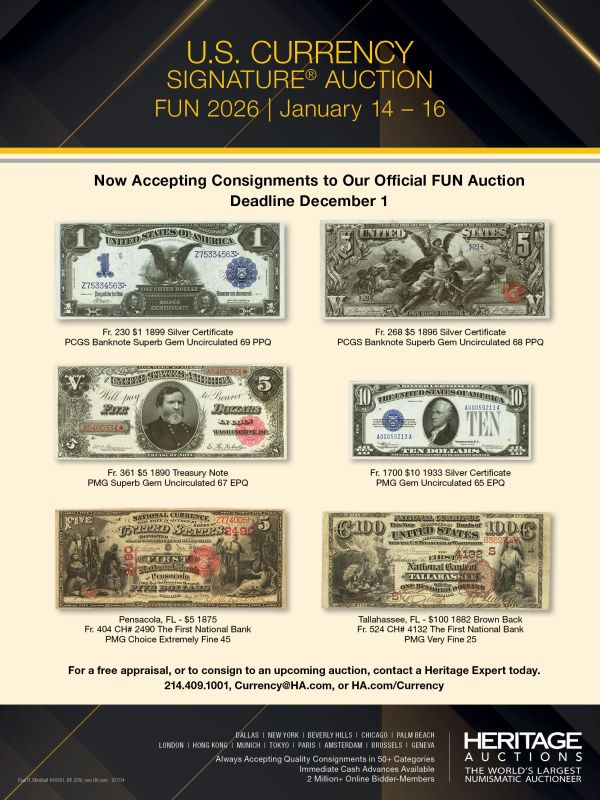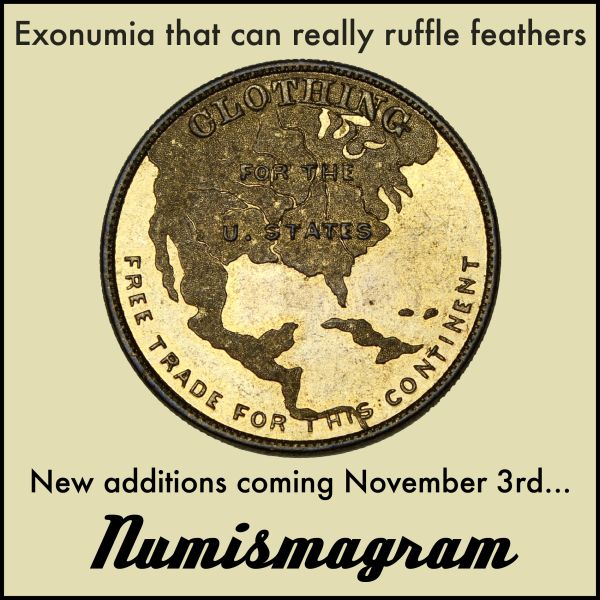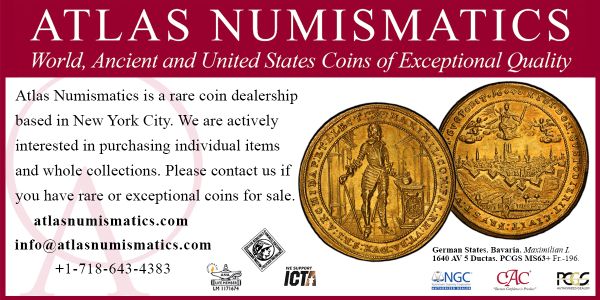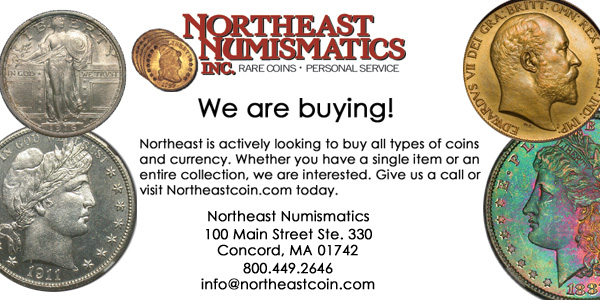
Visit our NBS Sponsors
About UsThe Numismatic Bibliomania Society is a non-profit association devoted to the study and enjoyment of numismatic literature. For more information please see our web site at coinbooks.org SubscriptionsThose wishing to become new E-Sylum subscribers can go to the following web page
Subscribe
MembershipThere is a membership application available on the web site Membership Application To join, print the application and return it with your check to the address printed on the application. Print/Digital membership is $40 to addresses in the U.S., and $60 elsewhere. A digital-only membership is available for $25. For those without web access, write to: Jeff Dickerson, Treasurer AsylumFor Asylum mailing address changes and other membership questions, contact Jeff at this email address: treasurer@coinbooks.org SubmissionsTo submit items for publication in The E-Sylum, write to the Editor at this address: whomren@gmail.com BUY THE BOOK BEFORE THE COINSale CalendarWatch here for updates! |
- WAYNE'S WORDS: THE E-SYLUM NOVEMBER 2, 2025
- KOLBE & FANNING NOVEMBER 2025 SALE ANNOUNCED
- L.E. BRUUN'S PERSONAL LIBRARY SALE
- NEW BOOK: MEROVINGIAN COINS
- NEW BOOK: NEPTUNE'S FORTUNE
- BOOK REVIEW: THE NUMISMATIST'S GUIDE
- B. MICHAEL THORNE (1942-2025)
- NEW BOOK: THE CHARLOTTE MINT 1837–1861
- NUMISMATIC TRICK-OR-TREAT FOR HALLOWEEN
- VIDEO: BRANCH MINT AT DAHLONEGA, GEORGIA
- NOTES FROM E-SYLUM READERS: NOVEMBER 2, 2025
- VOCABULARY TERM: SAND CAST, SAND CASTING
- ALPHONSE ANTON KOLB (1893-1983)
- MINT'S DIRECTOR NOMINEE PAUL HOLLIS TESTIFIES
- MSNS FALL 2025 CONVENTION SPEAKERS
- ATLAS NUMISMATICS SELECTIONS: NOVEMBER 2, 2025
- DOYLE NOVEMBER 4, 2025 WASHINGTONIA SALE
- STACK'S BOWERS: RICHARD AUGUST COLLECTION
- KUENKER AUCTION SALE 432
- STACK'S BOWERS: JOHN PACK WASHINGTONIANA
- HERITAGE: NOV. 13-14 U.S. COINS SIGNATURE
- THE RESTORATION COINAGE OF TRAJAN DECIUS
- 1715 FLEET: A 1703 LIMA MINT EIGHT REALES
- ON ARCHAEOLOGISTS AND TREASURE HUNTERS
- BARCLAY'S BANK CARIBBEAN BANKNOTES
- AMERICAN MINT SETTLES PENNSYLVANIA LAWSUIT
- LOOSE CHANGE: NOVEMBER 2, 2025
- ARGOSY BOOK STORE'S 100TH YEAR
- ABOUT THIS ISSUE: NOVEMBER 2, 2025
Content presented in The E-Sylum is not necessarily researched or independently fact-checked, and views expressed do not necessarily represent those of the Numismatic Bibliomania Society.
WAYNE'S WORDS: THE E-SYLUM NOVEMBER 2, 2025
 New subscribers this week include:
Stephanie Hudson.
Welcome aboard! We now have 6,805 subscribers.
New subscribers this week include:
Stephanie Hudson.
Welcome aboard! We now have 6,805 subscribers.
Thank you for reading The E-Sylum. If you enjoy it, please send me the email addresses of friends you think may enjoy it as well and I'll send them a subscription. Contact me at whomren@gmail.com anytime regarding your subscription, or questions, comments or suggestions about our content.
This week we open with three new books, two book reviews, an obituary, updates from the Newman Numismatic Portal, and more.
Other topics this week include Merovingian coins, the Charlotte and Dahlonega mints, sand casting, Alphonse Kolb, Paul Hollis, Mike Thorne, MSNS convention speakers, fixed price and auction previews, the 1715 Fleet, the American Mint and the Argosy Book Store.
To learn more about Russian numismatics, L.E. Bruun's library, Neptune's Fortune, The Numismatist's Guide, Postmaster Alonzo H. Sawyer, the $16 Moffat ingot, U.S. Paper Money errors, the Excelsior Copper, the Presidency Resigned medal, archaeologists and treasure hunters, gates, sprues and vents, Brown Friday and A Guide to Chocolate Coins, read on. Have a great week, everyone!
Wayne Homren
Editor, The E-Sylum
KOLBE & FANNING NOVEMBER 2025 SALE ANNOUNCED
Kolbe & Fanning have announced their next numismatic literature sale, featuring books on Russian, ancient, world and U.S. numismatics. -Editor
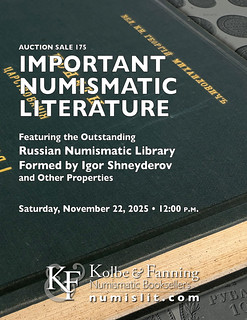 Kolbe & Fanning Numismatic Booksellers are pleased to announce that we will be holding our 175th auction sale on Saturday, November 22, 2025. Headlining the sale is the outstanding library on Russian numismatics formed by Igor Shneyderov, which includes most of the classic works on the subject. The sale also features a variety of rare and out-of-print works on ancient, world and U.S. numismatics, with notable material on Islamic coins from the library of the well-known former ANS Curator Michael Bates. With over 500 lots, there is something for everybody.
Kolbe & Fanning Numismatic Booksellers are pleased to announce that we will be holding our 175th auction sale on Saturday, November 22, 2025. Headlining the sale is the outstanding library on Russian numismatics formed by Igor Shneyderov, which includes most of the classic works on the subject. The sale also features a variety of rare and out-of-print works on ancient, world and U.S. numismatics, with notable material on Islamic coins from the library of the well-known former ANS Curator Michael Bates. With over 500 lots, there is something for everybody.
Some highlights of this first sale include:
L.E. BRUUN'S PERSONAL LIBRARY SALE
This short Facebook reel gives a first look at L.E. Bruun's personal reference library coming to auction soon. There are over 2,000 volumes. This is our first attempt at embedding a video from Facebook, so let us know if you're having any issues. -Editor
NEW BOOK: MEROVINGIAN COINS
France's Society for Numismatic and Archaeological Studies has published the 12th volume of its Research and Works of the Society, focusing on Merovingian coins. Co-author Philippe Schiesser submitted this overview in English. Thank you. The book is entirely in French. -Editor
 DU TRÉSOR ROYAL AU SALAIRE DE LA MINE MONNAIES, MONÉTAIRES ET POUVOIRS MÉROVINGIENS Recherches et Travaux de la Société d'Études Numismatiques et Archéologiques n° 12, Société d'Études Numismatiques et Archéologiques (SÉNA), Paris, 2025.
DU TRÉSOR ROYAL AU SALAIRE DE LA MINE MONNAIES, MONÉTAIRES ET POUVOIRS MÉROVINGIENS Recherches et Travaux de la Société d'Études Numismatiques et Archéologiques n° 12, Société d'Études Numismatiques et Archéologiques (SÉNA), Paris, 2025.
FROM ROYAL TREASURY TO MINE WAGES: MEROVINGIAN COINS, MONETARY, AND POWERS, Research and Works of the Society for Numismatic and Archaeological Studies n° 12. Book entirely in French.
Inès Villela-Petit, Karim Meziane et Philippe Schiesser (dir.),
SENA Members: €35 France, €45 Outside France
Public price France including shipping €40, Public price Outside France including shipping €50
NEW BOOK: NEPTUNE'S FORTUNE
A new book to be released in January chronicles the story of the legendary Spanish galleon the San José. See also two other articles elsewhere in this issue related to this book and the 1715 Fleet. -Editor
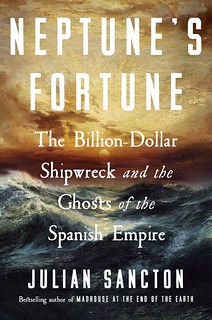 Neptune's Fortune: The Billion-Dollar Shipwreck and the Ghosts of the Spanish Empire
Neptune's Fortune: The Billion-Dollar Shipwreck and the Ghosts of the Spanish Empire
by Julian Sancton (Author)
Roger Dooley wasn't looking for the San José. But an accidental discovery in the dusty stacks of a Spanish archive led him to the story of a lifetime, the tale of a great eighteenth-century treasure ship loaded with riches from the New World and destined for Spain. But that ship, the galleon San José, met a darker fate. It was drawn into a pitched battle with British ships of war off the coast of Cartagena, and when the smoke cleared, the San José and its bounty had disappeared into the ocean, its coordinates lost to time.
Though a diver at heart, Dooley was an unlikely candidate to find the San José. He had little in the way of serious credentials, yet his tenacity and single-minded devotion to finding and excavating the ship powered him across four decades, even as he became a man in exile from the country of his birth. As Dooley jousted with famous treasure hunters and well-funded competitors, he slowly homed in on a patch of sea that might contain a three-hundred-year-old shipwreck—or nothing at all.
THE BOOK BAZARRE
BOOK REVIEW: THE NUMISMATIST'S GUIDE
Dr. Lawrence J. Lee has a longtime interest in numismatic scholarship and disdain for the lack of academic numismatic programs in the U.S. At my request, he submitted this review of Patrick O'Connor's new book, The Numismatist's Guide. Thank you! It takes a lot of time and thought to review a book, particularly one as large and detailed as this. -Editor
 O'Connor, Patrick. The Numismatist's Guide: Standard Reference for the Study of Coins and Paper Money. San Antonio, TX: Aurora Rarities, LLC, 2025. English, 420 pages, full color.
O'Connor, Patrick. The Numismatist's Guide: Standard Reference for the Study of Coins and Paper Money. San Antonio, TX: Aurora Rarities, LLC, 2025. English, 420 pages, full color.
Patrick O'Connor has written what can accurately be described as a textbook of numismatic knowledge. His book, The Numismatist's Guide: Standard Reference for the Study of Coins and Paper Money (hereafter, the Guide) not only lives up to its name, but provides a process so that the book can continue to grow and improve as new information is gathered and inserted.
And to be honest, the numismatic community has needed a systematic approach to the study of coins for decades. What has long been considered the numismatic go-to textbook has been Philip Grierson's fifty-year old classic by that very name, Numismatics. Grierson was an expert on medieval and Byzantine coinage, but he actually used coins as an adjunct to teach history, his primary interest. Thus, the first half of his book is on the history of coinage, starting with Greek, Romans and other ancient cultures, moving then onto the Eastern cultures of coinage and finally modern European traditions. It is not until rather late in the book that he begins talking about coin symbolism, minting techniques, coin hoards and, finally on page 140, dealing with the actual techniques and metrology the numismatist will employ. Grierson also wrote primarily on "ancient" coinage, he wrote before the era of grading companies and colored stickers, and the Newman Portal, to say nothing of XRF machines, were unimagined complications to the science of numismatics.
B. MICHAEL THORNE (1942-2025)
Numismatic News published an obituary of author Mike Thorne. With permission, here's an excerpt. He was born September 7, 1942 and died October 12, 2025. -Editor
 Mike Thorne died on October 12 of a heart attack at his home in Starkville, Miss. He grew up in Shreveport, La., attained three degrees from Louisiana State University ('64, '67, '69), and was Professor Emeritus of Psychology at Mississippi State University.
Mike Thorne died on October 12 of a heart attack at his home in Starkville, Miss. He grew up in Shreveport, La., attained three degrees from Louisiana State University ('64, '67, '69), and was Professor Emeritus of Psychology at Mississippi State University.
Mike retired from MSU in 2002 but continued to teach part-time until 2009, when he ended his 40-year teaching career. He was an animal researcher, his department's graduate coordinator, the editor of a psychology journal, the author of 87 research articles, and four psychology textbooks.
He began collecting coins with his father in 1953. Mike was a member of the ANA since 1971 and the Numismatic Literary Guild since 1980. He was a Heritage Auctions Legacy Client and had several PCGS and NGC registry sets.
NEW BOOK: THE CHARLOTTE MINT 1837–1861
The latest addition to the Newman Numismatic Portal is The Charlotte Mint 1837–1861. Project Coordinator Len Augsburger provided the following report. -Editor
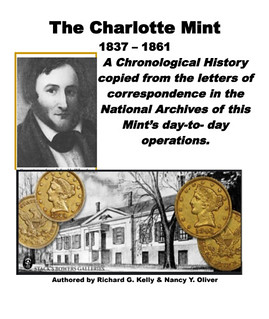 Kelly & Oliver Publish on the Charlotte Mint
Kelly & Oliver Publish on the Charlotte Mint
The Charlotte Mint 1837–1861, by Richard G. Kelly and Nancy Y. Oliver, presents a detailed chronological history of the Charlotte Branch Mint based largely on the original correspondence of Superintendent John H. Wheeler and other officials preserved in the U.S. National Archives. Established by the Act of March 3, 1835, the Charlotte Mint was one of three southern branch mints created to process locally mined gold. The volume traces the Mint's formation, its first bullion deposits in 1837, and the long-delayed start of coinage in March 1838. The authors compile the surviving letters between the Superintendent, Mint Director Robert M. Patterson, and key officers like Coiner John R. Bolton and Assayer Dr. John H. Gibbon, revealing the logistical, mechanical, and administrative struggles that marked its early operations—broken rollers, leaking zinc roofs, acid shortages, and personal disputes.
NUMISMATIC TRICK-OR-TREAT FOR HALLOWEEN
Newman Numismatic Portal Project Coordinator Len Augsburger also compiled the following examples of numismatic Halloween treats. I added a photo of a mystery contemporary numismatist - can anyone guess who this is? Hint: not me. -Editor
Numismatic Trick-or-Treat for Halloween
 As the annual festival of sugar approaches, we review numismatic approaches to dealing with dressed up candy collectors. The November 8, 2015 E-Sylum reported "John Nebel of Colorado collects ancient coins, and on Halloween he offers trick-or-treaters a choice of candy or an ancient coin. Cruel choice, but a fun exercise." Nebel said that many selected "treats" in favor of more valuable coins.
As the annual festival of sugar approaches, we review numismatic approaches to dealing with dressed up candy collectors. The November 8, 2015 E-Sylum reported "John Nebel of Colorado collects ancient coins, and on Halloween he offers trick-or-treaters a choice of candy or an ancient coin. Cruel choice, but a fun exercise." Nebel said that many selected "treats" in favor of more valuable coins.
David Gladfelter noted in the October 22, 2017 E-Sylum "A trick-or-treat idea that has worked well for us for a number of years is to put fright stickers on half dollars and hand them out. Many of the kids have never seen a half dollar before, and ask what they are. The kids are always happy, and so are we. No thrown-out fruit or candy littering our lawn, no parents disapproving of what the kids bring home, and best of all, no left over bags of candy growing stale for us to use up and gag on."
VIDEO: BRANCH MINT AT DAHLONEGA, GEORGIA
The David Lisot Video Library on the Newman Numismatic Portal can be found at:
https://nnp.wustl.edu/library/multimediadetail/522852
We highlight one of his videos each week in The E-Sylum. Here's one from 2016 with Carl Lester speaking about the Dahlonga Mint. -Editor
NOTES FROM E-SYLUM READERS: NOVEMBER 2, 2025
All the Cents in North Carolina
Regarding MrBeast's video,
Garrett Ziss writes:
"I might be missing something entirely obvious here, but if there aren't 1.2 million cents in all the banks in North Carolina, then where are the billions of cents minted each year going? North Carolina made up about 3.17% of the U.S. population in 2018 (when the "I Bought A Car Using Only Pennies" video was released), which would suggest only 37.85 million cents were available from banks. That is just 0.48% of the 7,803,200,000 combined mintage for Philadelphia and Denver reported in the Red Book for 2018, not to mention the billions of existing cents made before 2018."
Good point, although the cents in the hands of banks are the only readily available ones, and you'd have to travel to every bank in the state to get them. And only Santa Claus could visit every household and hoover up the rest of the cents from every piggy bank and couch cushion in the state. -Editor
To read the earlier E-Sylum article, see:
MRBEAST CASH STUNTS
(https://www.coinbooks.org/v28/esylum_v28n43a27.html)
Other topics this week include postmarks on Civil War scrip notes, the Colonial Coin Club of Pennsylvania, and Mary Wagner's Fancy Turning. -Editor
VOCABULARY TERM: SAND CAST, SAND CASTING
Here's another entry from Dick Johnson's Encyclopedia of Coin and Medal Terminology. -Editor
Sand Cast, Sand Casting. The casting, or making a cast in a mold made of sand. Because sand casts typically have porous and uneven surfaces they are not suitable for coin models but can be ideal for making medals where a somewhat grainy surface is desired. Sand casts are usually large medallic items, as plaques or foundry cast patterns. An example was the Special Medal of Honor of the National Sculpture Society, where artist Laura Gardin Fraser wanted a more typical sculptural treatment for the glyptic field's highest award medal.
ALPHONSE ANTON KOLB (1893-1983)
E-Sylum Feature Writer and American Numismatic Biographies author Pete Smith submitted this article on medalist Alphonse Kolb. Thanks! -Editor
I have about fifty medals struck from dies produced by Alphonse Kolb. He is known for producing dies for the presidents of the Rochester Numismatic Association. One of those was for Kolb himself.
Kolb was born in Waldsteffen, Gmund, Germany on December 5, 1893. He was the son of Karl Kolb and Mary Kinle. He was an apprentice at a jewelry company at age fifteen and studied art and sculpture in Munich and the Hamberg Art Institute.
Alphonse married Elfrieda L. Reichelt (1877-1945) on September 4, 1918. At the time, he was 25 and she was 41. His second marriage was to Kathryn Yohann Kolb (1887-1968).
Much of his story was in his obituary in the Rochester Democrat and Chronicle for March 31, 1983.
Kolb joined the Rochester Numismatic Association on November 14, 1922. He joined the American Numismatic Association on June 1, 1923, as member 2528 from his home at 453 Clinton Avenue in Rochester, New York. He converted to life membership in February 1949. as LM 228 from 120 Collingwood Drive and remained a member for 59 years. His collecting interests focused on medals.
MINT'S DIRECTOR NOMINEE PAUL HOLLIS TESTIFIES
Dennis Tucker submitted this article about Paul Hollis's Senate hearing this past Thursday. Thank you! -Editor
Today was a big day for American coins and medals—and for the office of the Director of the United States Mint. At 10:00 this morning, in the Dirksen Senate Office Building, several presidential nominees met for statements and questioning before the Committee on Banking, Housing, and Urban Affairs. Among them was Mr. Paul Hollis of Louisiana, the first longtime numismatist ever to be nominated as the Mint's Director.
Every modern Mint Director has spoken publicly of a personal interest in coins. But Paul Hollis has actually collected and studied coins since childhood, and has been a member of the American Numismatic Association for decades. He's an active participant in both the "hobby" side and the "market" side of coins.
In his testimony Hollis told the assembled Senators, "One of my earliest and most vivid memories dates back to when I was just seven years old. My grandmother gave me a coin that she had saved during the Great Depression. That small gesture left a lasting impression that quietly steered the course of my life. Today, I keep the coin that she gave me nearly a half-century ago as a tribute to her. I have kept the coin in my pocket at every important milestone in my life. And of course, it is here with me today, along with the catalog of coins that I made when I was just eight years old."
MSNS FALL 2025 CONVENTION SPEAKERS
The Michigan State Numismatic Society has a nice lineup of speakers for their upcoming fall convention. -Editor
NOVEMBER 14-16, 2025
 11:00 a.m. Meeting room Tim Coleman, speaker
11:00 a.m. Meeting room Tim Coleman, speaker
The History of Canadian Coinage
This presentation will focus on how trade & acquiring goods evolved as European Explorers arrived in Northern America. The changes that occurred as non-indigenous people from various countries influenced coinage as the developing provinces came together forming a country.
ATLAS NUMISMATICS SELECTIONS: NOVEMBER 2, 2025
Atlas Numismatics has updated their website with 596 new coins, medals, and tokens at fixed prices. Select items are discussed below. -Garrett
1084994 | GREEK. CALABRIA. Tarentum (Taras). Struck circa 280-272 BC. AR Didrachm. NGC Ch. XF? (Choice Extremely Fine ?) Strike 5/5 Surface 5/5. 7.73gm. Naked ephebe on pacing horse left, crowning horse's head with wreath; SA to right; ???-TO? in two lines below / ????S. Youthful oikist, nude, riding dolphin to left, holding a tripod in his outstretched right hand and resting his left on the dolphin; below, ??S. HN III 957; Vlasto 666.
DOYLE NOVEMBER 4, 2025 WASHINGTONIA SALE
Doyle is auctioning a group of Washington medals in their November 4, 2025 sale. Here's an article written by Chris Bulfinch, Appraiser and Specialist of Coins, Stamps, Currency and Collectibles. -Editor
George Washington's well-documented aversion to representation on currency notwithstanding, a life as consequential as his inevitably earned monetary and medallic plaudits. Even before he was first featured on Treasury Notes in the 1840s and Federally-issued circulating U.S. currency in the 1860s (which would have chagrined him), Washington appeared on medals and tokens within his lifetime. Some tokens and medals depicting him are exceedingly rare, even unique, others are quite common. His likeness even appeared on Civil War dog tags and currency issued by the Confederacy, as both sides invoked his image and revered persona in support of their respective causes.
Some collectors of U.S. tokens and medals (material broadly defined as "exonumia") choose to focus on depictions of Washington, and prominent numismatists and researchers have made efforts to catalog medallic appearances of the First President. Numerous such efforts have been attempted since the nineteenth century, notably U.S. Mint Director James Ross Snowden's A Description of the Medal of Washington; of National and Miscellaneous Medals published in 1861, covering mainly Washington medals in the Mint's own cabinet. William Spohn Baker's 1885 Medallic Portraits of Washington is a widely-lauded work on the topic; original copies were voted the 49th most desirable piece of numismatic literature by the membership of the Numismatic Bibliomania Society in 2007. George Fuld and Russell Rulau, two of the last century's foremost experts on American exonumia, published two expansions of Baker's work in the 1980s (a centennial edition) and 1990s; Fuld published an expansion of Baker on his own in 1965. Neil Musante's two-volume 2016 work Medallic Washington is a must-own for collectors of numismatic Washingtonia. Many of the finest minds in American numismatics have dedicated some part of their research efforts to cataloging as comprehensively as possible medallic depictions of Washington, and some of the finest collectors of American coins, tokens, medals, and paper money have built sophisticated collections of such material.
STACK'S BOWERS: RICHARD AUGUST COLLECTION
Stack's Bowers will be selling the Richard August Collection on November 10. Select Colonial & Early American Highlights are discussed below. -Garrett
1652 Pine Tree Shilling. Large Planchet. Noe-1, Salmon 1-A, W-690. Rarity-2. Pellets at Trunk. AU-55 (PCGS). The iconic Noe-1 Pine Tree shilling is regarded as the quintessential type coin in the Massachusetts Bay Colony silver series. These pieces were the first struck for those British colonies that would eventually become part of the United States. They are also among the few American colonial issues struck in silver. Produced to an uncommonly high standard of quality, and relatively plentiful by Massachusetts silver standards, the Noe-1 Pine Tree is a perennial favorite among both colonial type collectors and series specialists. This is an attractive and inviting specimen at the Choice AU grade level that is worthy of strong bids.
KUENKER AUCTION SALE 432
On 10 November 2025, Künker will offer a special collection of Chinese coins. It contains, among other things, the collection of a sinologist from an old family estate. Look forward to many rarities – from early Chinese cash coins to rarities of modern Chinese coinage. -Garrett
It was great Emperor Qin Shihuangdi, whose tomb is still admired by countless tourists in Xi'an today, who unified the empire during his reign and who ensured that the local currency of western China became the currency of China as a whole. The result was the cash coin, which circulated in China for almost two millennia.
You will find some interesting examples showcasing the evolution of cash coins at Künker's upcoming auction. The spectrum ranges from the Chen dynasty to the Qing dynasty.
Of particular interest is a Chinese cash coin created by the Heaton / Birmingham private mint, which was highly active in China at the time. It is probably an early, unpublished pattern intended to demonstrate the superiority of machine-minting compared to traditional methods. After all, in contrast to modern coins, Chinese cash coins were cast, not minted.
While the Heaton Mint in Birmingham certainly had superior technical expertise, the same could not be said for its cultural understanding. They simply based their issues on the wrong model: a Chinese cash coin which, although rather common, had long been outdated.
STACK'S BOWERS: JOHN PACK WASHINGTONIANA
Stack's Bowers will be selling the Washingtoniana from the John M. Pack Collection on November 12. Select items are discussed below. -Garrett
Undated (ca. 1777) Voltaire Medal. Musante GW-1, Baker-78B, Betts-544. Copper. AU-58 (PCGS). 39.9 mm. 333.1 grains. For most of the history of this medallic work, it has been misunderstood because the facts surrounding its genesis were seemingly masked. As a result, collectors have been left to their own imaginative devices. Though the medal was produced by a skilled hand, neither die bears the signature of an engraver. The assignment of a French origin is easy to apply based solely on the French language reverse inscription, but to this day, the source remains uncertain. The attribution of Voltaire as having some degree of authorship in the medal is another seemingly clear conclusion, as that same French-language legend is taken directly from his 1723 poem, La Henriade. The circumstances of Voltaire's life around the time of the issuance of this medal, however, make it quite unlikely that his hand was involved. Though it has long been accepted as the first portrait medal of Washington, the conspicuous fact that the portrait looks nothing like Washington has perplexed many collectors. Indeed, the Voltaire medal is shrouded in a degree of mystery that is difficult to accept as anything other than purposeful.
HERITAGE: NOV. 13-14 U.S. COINS SIGNATURE
Heritage published the following article in their latest press release entitled Condition Census 1908-S Double Eagle Takes Flight at Heritage's U.S. Coins Auction. -Garrett
One of the highest-graded examples from the lowest mintage Saint-Gaudens With Motto issue will be thrust into the spotlight when it crosses the auction block in Heritage's Nov. 13-14 U.S. Coins Signature® Auction — an event that includes an exceptional selection of rare and high-end gold.
The 1908-S Double Eagle, MS67 PCGS. CAC from The Alymaya Collection, Part III that is in play in this auction is an extraordinary numismatic prize: PCGS has awarded higher grades to just two others.
THE RESTORATION COINAGE OF TRAJAN DECIUS
Mike Markowitz wrote an article in CoinWeek on The Restoration Coinage of Trajan Decius. -Garrett
As part of his effort to promote traditional beliefs, Trajan Decius issued a series of coins commemorating eleven of his deified predecessors. Numismatists refer to these coins as the Divi series, or the "Consecration" or "Restoration" coinage of Trajan Decius.
Some deified former emperors were not included and numismatists are baffled by who made the list and who did not. There were no coins for Julius Caesar, Claudius, Lucius Verus, Pertinax or Caracalla, who were all deified.
The coins were antoniniani, or "double denarii" of debased silver. Carelessly struck, often from worn dies on ragged blanks, these pieces generally bear portraits of excellent quality, suggesting that the engravers were familiar with coins that were as much as two centuries old at the time. Each emperor depicted wears the spiked "radiate crown" that was the symbol for the double denarius denomination, although it is very unlikely that any of these men would have ever actually worn such headgear.
1715 FLEET: A 1703 LIMA MINT EIGHT REALES
The 1715 Fleet Society is a non-profit organization that is "dedicated to researching the history of the 1715 Fleet, its loss, rediscovery, and recovery." The 1715 fleet was part of the Spanish New World Treasure Fleets that funded Spain's activities as a world leader.
Each month the group highlights a "Treasure of the Month". November's treasure is a 1703 Lima Mint Eight Reales from the maor find reported last month. -Editor
Our Treasure of the Month for November is a tiny piece of last month's Treasure of the Month. In October, we featured a recent find of over 1,000 silver eight reales coins recovered in July 2025 by Captain Levin Shavers and the crew of the M/V Just Right. Our treasure is a beautiful eight reales from the Spanish colonial mint located in Lima, Peru.
The obverse of this coin reveals an almost perfectly centered feature with a bold "703" designating the year the coin was minted — 1703. Likewise, the reverse displays a perfectly centered cross with visible lions and castles.
ON ARCHAEOLOGISTS AND TREASURE HUNTERS
A Washington Post Opinion piece by the author of the upcoming book Neptune's Fortune discusses the "uneasy symbiosis" of archaeologists and treasure hunters. See also the previous article in this issue from the 1715 Fleet Society and the one elsewhere in this issue on the book. -Editor
 Julian Sancton is the author of the forthcoming book "Neptune's Fortune: The Billion-Dollar Shipwreck and the Ghosts of the Spanish Empire."
Julian Sancton is the author of the forthcoming book "Neptune's Fortune: The Billion-Dollar Shipwreck and the Ghosts of the Spanish Empire."
On the night of July 30, 1715, a dozen Spanish ships were sailing north along Florida's Atlantic coast, weighed down with gold and silver stripped from the mines of the New World. Before dawn, a hurricane swept across the fleet's path. It resulted in one of the deadliest maritime disasters in history, sinking 11 ships, killing more than 1,000 men and sending tons of gold and silver coins down to the ocean floor — worth an estimated $400 million today.
BARCLAY'S BANK CARIBBEAN BANKNOTES
Stack's Bowers Director of Consignments & Senior Numismatist Dennis Hengeveld published a nice article about the Caribbean Barclay's Bank specimen notes printed by Bradbury, Wilkinson & Co. -Editor
As we approach the final months of 2025 here at Stack's Bowers Galleries, we are already looking ahead to 2026. As is our tradition, the NYINC auction will be our first major world paper money event of the year. We have already started preliminary work for that sale, and I came across a group of specimen notes from the Jerry & Diane Fishman Collection that are the topic of this blog post. These specimens were printed by Bradbury, Wilkinson & Co. for Barclays Bank (Dominion, Colonial and Overseas) starting in 1926. The notes, which have always interested me, were prepared for the various branches of the bank in the Caribbean, and are a fascinating (but understudied) area of world paper money.
While the firm of Barclays can trace its history to late 17th-century London, the iteration of the company that concerns this blog post came about in 1925 following the amalgamation of the Colonial Bank, the National Bank of South Africa and the Anglo-Egyptian Bank, allowing Barclays to expand its overseas operations using the name Barclays Bank D.C.O. With the British Empire stretching across the world, the concept was the brainchild of chairman F.C. Goodenough, who wished to ease transactions of Barclays customers in the United Kingdom with the territories and thus make it easier for people to use the bank's services no matter where they were.
AMERICAN MINT SETTLES PENNSYLVANIA LAWSUIT
A collectibles marketing business headquartered near Harrisburg, PA settled a lawsuit over its sales practices. Here's an excerpt from an article published yesterday in the Pittsburgh Post-Gazette. -Editor
A Mechanicsburg company that sells collectible coins agreed to pay $750,000 to settle an investigation by the Attorney General's Office that found the company misled customers into unwanted subscription plans through deceptive sales practices.
The settlement by America Mint, LLC, comes after more than 200 consumer complaints about the company's "negative option" subscriptions and other business practices, according to the attorney general's office.
Negative option subscriptions are where a customer's silence or inaction is interpreted as acceptance of additional purchases.
LOOSE CHANGE: NOVEMBER 2, 2025
Here are some additional items in the media this week that may be of interest. -Editor
While some stores are skipping right to five-cent rounding, my hometown grocery chain is offering to buy pennies to continue making exact-cent change. -Editor
 With the production of the U.S. penny coming to an end and the Federal Reserve limiting penny deliveries, Giant Eagle has announced a penny exchange day that will allow customers to earn double the amount they turn in.
With the production of the U.S. penny coming to an end and the Federal Reserve limiting penny deliveries, Giant Eagle has announced a penny exchange day that will allow customers to earn double the amount they turn in.
The Pittsburgh-based grocery announced Tuesday that on November 1, they will be collecting pennies in exchange for double gift card rewards.
From 11 a.m. to 4 p.m. on Saturday, customers that bring their spare pennies into any Giant Eagle or Market District will receive a gift card that is worth double the number of pennies exchanged.
The offer is good for quantities totaling 50 cents to $100 dollars. -Editor
To read the complete article, see:
Giant Eagle offering gift cards in exchange for spare pennies
(https://www.audacy.com/kdkaradio/news/local/giant-eagle-offering-gift-card-in-exchange-for-spare-pennies)
Len Augsburger passed along this BBC piece on the penny shortage. Thanks. -Editor
Now store clerks don't know what to do when their tills are bare and someone needs change in pennies from a cash purchase.
The temporary solution for many, Mr Jeon said, is rounding the price of the sale up or down to the nearest five cents so the customer can use a nickel, the next lowest tender in the US.
But some cities, including New York, require retailers to give exact change and others don't allow cash payments to differ from card payments for the same item, Mr Jeon said.
To avoid lawsuits and customer complaints, many retailers have chosen to just round down.
"You're talking about losing up to four cents for every cash transaction across multiple stores across the country," he said. "It's unsustainable."
Many stores are now urging customers to pay in exact change. Others are hosting promotions for customers to bring in extra pennies they have at home.
Convenience giant Kwik Trip has announced it is rounding down to the nickel, which it says will cost it up to $3m (£2.3m) this year.
To read the complete article, see:
https://www.bbc.com/news/articles/c20556ly45eo
(https://www.bbc.com/news/articles/c20556ly45eo)
Other topics this week include a fantasy 1917 Australia Halfpenny mule. -Editor
ARGOSY BOOK STORE'S 100TH YEAR
For bibliophiles, Len Augsburger passed along this New York Times article about the iconic NYC Argosy Book Store. Thanks. Here's an excerpt - see the complete article online. -Editor
 Louis Cohen had a sly way of getting his daughters to work at his shop, the Argosy Book Store, when each graduated from college beginning in the 1950s.
Louis Cohen had a sly way of getting his daughters to work at his shop, the Argosy Book Store, when each graduated from college beginning in the 1950s.
"He was very clever and purposely let it be our idea," recalled his eldest daughter, Judith Lowry. "When people asked over the years how he got all three of his daughters to work for him, he'd say, ‘I guess I'm just lucky.'"
Mr. Cohen, who opened the Argosy in 1925 on a section of Fourth Avenue known as Book Row, was also clever enough in the 1950s to ensure the shop's longevity by buying the six-story building on East 59th Street that the business moved to in the 1930s and occupies today.
ABOUT THIS ISSUE: NOVEMBER 2, 2025
While I'd hoped to finish last week's issue early, it was not to be. The likely culprit was the fact that work tends to expand to fill the time allotted to it (Parkinson's Law). I had some time away from my day job due to the U.S. government shutdown and I got a head start before the weekend, but still ended up adding material into Sunday evening. It was a good, full issue and even then, as always, potential material was left unused. But those are good problems to have.
This week I spent part of Friday evening handing out candy to trick-or-treaters, then at the movies with my oldest son. We saw the new Emma Stone film, "Bugonia." We both enjoyed it. While I have nothing against superhero blockbusters, what I appreciate even more are original films. It being the opening night and Halloween to boot, our local Alamo was giving out "Bugonia" tote bags with a chocolate bar inside. In case any readers are interested in movie memorabilia, I'll bring the tote bag to the Whitman Baltimore show this Thursday afternoon.
Saturday was a day of E-Sylum editing in between meals, a shopping errand and three walks. At dusk I walked around a nearby lake and took this photo of the nearly full moon.
Finally, here are some interesting Halloween-themed non-numismatic articles I came across this week.
Who is the Real Wednesday Addams?
(https://lithub.com/who-is-the-real-wednesday-addams/)
Local Artist's Legacy Is Already Etched in Stone
(https://www.pittsburghmagazine.com/tombstone-designer-pittsburgh/)
Who is Jack of ‘Jack-o'-Lantern'?
(https://wordsmarts.com/jack-o-lantern/)
The Real-Life Haunting of Annabelle, a Doll Possessed
(https://www.esquire.com/news-politics/a69190693/annabelle-real-life-doll-haunting/)
How to Build a Haunted House
(https://www.lrb.co.uk/the-paper/v47/n20/jon-day/gloomth)
-Editor

